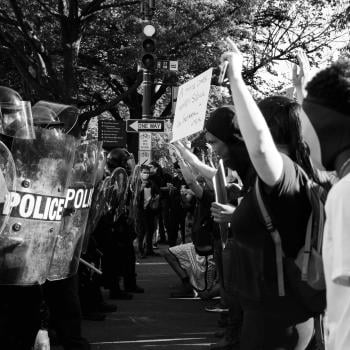
Religious Trauma Syndrome
Let’s talk about religious trauma; specifically what Dr. Marlene Winell calls, RTS (Religious Trauma Syndrome). RTS refers to the phenomenon she observed among people who left or were excommunicated by highly controlling religious groups. She writes,
“Religious Trauma Syndrome (RTS) is the condition experienced by people who are struggling with leaving (or the fallout of having left) an authoritarian, dogmatic religion and coping with the damage of indoctrination. They may be going through the shattering of a personally meaningful faith and/or breaking away from a controlling community and lifestyle. RTS is a function of both the chronic abuses of harmful religion and the impact of severing one’s connection with one’s faith.”
Defining Religious Trauma
The word religion comes from the Latin meaning “to bind, or bring together.” Conversely, the word trauma comes from the Greek meaning “wound.” By definition, religious trauma is the wounding of togetherness, the splitting of wholeness; it is the destruction of the very thing intended to care for us and bind us to ourselves, each other, and the Divine.
Psychologists know trauma is not simply an event that happened, but an event that continues to happen and can have a multitude of effects in the form of symptoms in our body, nervous system, and relationship to ourself and our environment.
Symptoms & Causes of RTS
Winell outlines potential symptoms of RTS:
- Cognitive: Confusion, poor critical thinking ability, negative beliefs about self-ability & self-worth, black & white thinking, perfectionism, difficulty with decision-making
- Emotional: Depression, anxiety, anger, grief, loneliness, difficulty with pleasure, loss of meaning
- Social: Loss of social network, family rupture, social awkwardness, sexual difficulty, behind schedule on developmental tasks
- Cultural: Unfamiliarity with secular world; “fish out of water” feelings, difficulty belonging, information gaps (e.g. evolution, modern art, music)
She also outlines the root causes of these symptoms:
- Suppression of normal child development – cognitive, social, emotional, moral stages are arrested
- Damage to normal thinking and feeling abilities – information is limited and controlled; dysfunctional beliefs taught; independent thinking condemned; feelings condemned
- External locus of control – knowledge is revealed, not discovered; hierarchy of authority enforced; self not a reliable or good source
- Physical and sexual abuse – patriarchal power; unhealthy sexual views; punishment used as for discipline
I saw a meme a number of years back that said something to the effect of, “If you at some point believed men have one fewer rib than women, then you have religious trauma.” It made me laugh, partially because I definitely believed that as a kid, but also, I had never really “unbelieved” it either! It is certainly a silly belief now, but there are many beliefs, assumptions, doctrines, and spiritual axioms that construct reality in specific ways, and set the stage, and potentially groom followers for abuse.
The Ultimate Double Bind
Take for example, the church’s doctrine of original sin, which assumes that all humans are essentially sinful and condemned to hell from birth. Dr. Winell writes, “The doctrines of original sin and eternal damnation cause the most psychological distress by creating the ultimate double bind. You are guilty and responsible, and face eternal punishment. Yet you have no ability to do anything about it.”
Below are a few examples of this in common Christian vernacular.
- You are a sinner, but God loves you anyway.
- You were dead, but God saved you.
- God is your salvation, and without him, you are lost.
- On your own nothing is possible, but with God, all things are possible.
- Let everything you do be pleasing to the Lord.
This is a short list, and I’m sure you can add to it. Now allow me to play God’s-advocate for a second, I know these statements have historically come in a positive light. Probably 90% of the time, they were meant to comfort, but that’s part of the gaslighting of it all! Because we are guilty, and there isn’t anything we can do about it, we must abdicate large portions of agency and personhood in order to, quite literally, save our lives.
Christian Codependency
When we abdicate our agency we no longer have a solid identity to live and relate from. In Jungian terms, we attempt to relate to the Self without a solid ego (Read previous article, How Religion Protects & Deprives Us). We’re then told that our “identity is in Christ.” This sounds great! The problem has a solution. This issue, however, is that the problem and solution come from the same broken system. When we buy into the problem, “I’m not worthy” and then purchase the solution, “My identity is only in Christ.” our identity is dictated by whatever form “Christ” takes. In this scenario, we move from interdependence to codependency. Our self-esteem is diminished and we are primed for abuse.
Codependency Defined: a psychological condition or a relationship in which a person manifesting low self-esteem and a strong desire for approval has an unhealthy attachment to another often controlling or manipulative person.
Here are a few articles on codependency, if you’d like to read more.
Leaning into Recovery from Codependency
Identifying Religious Abuse and Neglect
“As long as we remain in an obedient, dependent position, we banish many of our own qualities into the shadow, including our inquisitiveness, financial ambitions, emotional, and sexual needs, and creative longings. In this way, our own development is derailed.” – Connie Zweig, PhD | Meeting the Shadow on the Spiritual Path, pg. 211
Perhaps you’re reading this and thinking, I don’t have religious trauma, and I’ve not experienced Christ like this. I certainly haven’t experienced the pain of physical, sexual, or direct emotional abuse. That may be true, but more common than overt abuse is the passive neglect followers experience, and are encouraged by their religious leaders to embrace, in their personal lives.
Neglect is a subcategory of abuse, but it is harder to detect and easier to conceal from further investigation. Below are a few questions to help discover possible neglect.
Religious Trauma Work Questions
- Did your religious community talk about sex? In what ways was sex portrayed?
- Did your religious community value certain emotions like anger, fear, sadness? What did you learn about these emotions from that community?
- What attitude did you have toward your body? Was it hypersexualized or desexualized?
- Were you taught to trust your body, bodily functions, and your boundaries? Or were you taught to be suspicious of your body and critical of it’s needs and functions?
- Were you ever forced to cut someone out of your life due to moral or religious differences?
- What did you learn about your own inner wisdom? Could you trust your thoughts, perspective, desires, etc.?
- What did you learn about decision making? What “spiritual check boxes” or discernment processes did you have to complete before making a big decision?
- Were you told God was a certain way though your experience and perspective didn’t align?
- Did you experience unresolvable and existential fear of death, punishment, divine-abandonment, or intrusive thoughts about what you should be doing for God?
Again, you can likely add many more bullet points here. Regardless if you’re fully committed to a religious community or you no longer associate with any formal religion, RTS can dictate much of how you live your life. It can flare up at the grocery store, a house party, a bar, and definitely if you get a hankering for Chick-fil-A. lol
Syndrome Defined
One quick note: A syndrome is by definition, “a group of symptoms which consistently occur together, or a condition characterized by a set of associated symptoms.” So, what keeps happening in your life that you feel no control over? Are you able to tie it back to a foundational religious or spiritual event or situation? Or perhaps did you experience abuse that was then unacknowledged, even supported by a religious community or belief system? Do the triggers seem to never get better, and you feel like you’re living the same trauma over and over again?
Meeting the Shadow on the Spiritual Path
“[…] shadow work for spiritual abuse and disillusionment requires that we reclaim lost parts of ourselves–self-worth, independent thinking, emotional shadows, bodily awareness, the capacity to initiate action, and images of god–that did not fit our spiritual persona, and that we now permit entirely new feelings and images to emerge.”
In her book Meeting the Shadow on the Spiritual Path, Dr. Connie Zweig outlines 6 categories of “Reclaiming” we are invited into when healing from religious trauma. Below I list the 6 reclaiming categories. If you’re interested in exploring this further, I I highly recommend purchasing and reading Dr. Zweig’s book (linked above). Dr. Zweig has a course starting January 18th titled Embracing the Spiritual Gifts of Age with Shadow-work.
- Reclaiming the Light
- Reclaiming Independent Thinking
- Reclaiming Authentic Feeling
- Reclaiming the Body
- Reclaiming Action on Our Behalf
- Reclaiming Images of the Divine
Want to Engage Further?
- 1:1 Shadow Work: Dr. Simmons offers 1 on 1 shadow work facilitation. The cost is $50/1 hour session. You can email him directly at [email protected].
- Upcoming Courses: Two learning opportunities are coming up.
- Welcoming Emotions Workshop
- Companioning Our Shadow: 4 Week Course on Shadow Work and Emotions

















